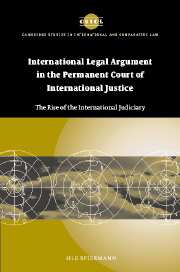 International Legal Argument in the Permanent Court of International Justice
International Legal Argument in the Permanent Court of International Justice Book contents
- Frontmatter
- Contents
- Foreword
- Acknowledgments
- Table of cases
- Table of treaties
- List of abbreviations
- Part 1 The Permanent Court of International Justice
- Part 2 International legal argument
- Part 3 International legal argument in the Permanent Court of International Justice
- Part 4 General conclusions
- 8 The legacy of the Permanent Court
- Appendix: List of Advisory Opinions, Judgments and Orders of the Permanent Court of International Justice
- Bibliography
- Index
- CAMBRIDGE STUDIES IN INTERNATIONAL AND COMPARATIVE LAW
8 - The legacy of the Permanent Court
Published online by Cambridge University Press: 17 July 2009
- Frontmatter
- Contents
- Foreword
- Acknowledgments
- Table of cases
- Table of treaties
- List of abbreviations
- Part 1 The Permanent Court of International Justice
- Part 2 International legal argument
- Part 3 International legal argument in the Permanent Court of International Justice
- Part 4 General conclusions
- 8 The legacy of the Permanent Court
- Appendix: List of Advisory Opinions, Judgments and Orders of the Permanent Court of International Justice
- Bibliography
- Index
- CAMBRIDGE STUDIES IN INTERNATIONAL AND COMPARATIVE LAW
Summary
International law as a complementary legal system
As an institution, or a project of international justice, the Permanent Court was a success, being the framework within which the world first experienced the development of an international judiciary. What remains so attractive about the Permanent Court is simply that it was a pioneering institution. During the negotiations of the Charter of the United Nations, there was little doubt that an International Court should be part of the institutional arrangement, and that it would be closely modelled on the Permanent Court. Despite the significant political changes in the world since 1945, many of which have been given legal form, there has been no decline in the international judiciary, and no change in the basic framework laid down after 1921 for the Permanent Court. At the turn of the twenty-first century, there were several active international courts in existence in addition to the principal judicial organ of the United Nations.
Many of the decisions of the Permanent Court concerned the interpretation of treaties that are now obsolete; most of them had emerged out of the conclusion of the First World War and most did not survive yet another upheaval of the world. More than sixty years later, there are often more recent and less eccentric precedents to cite. While many fields of international law are informed with quotations from various decisions of the Permanent Court, the exotic names of which are commonplace, the use of such quotations often has no relation to the original context and may indeed only be lingering on as echoes from a distant past.
- Type
- Chapter
- Information
- International Legal Argument in the Permanent Court of International JusticeThe Rise of the International Judiciary, pp. 393 - 404Publisher: Cambridge University PressPrint publication year: 2005


